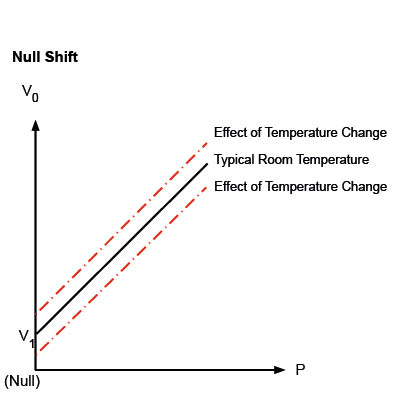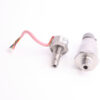Thermal zero shift represents the change in null resulting from a change in temperature. Null shift is not a predictable error because it can move up and down from unit to unit.
Changes in temperature will cause the entire output curve to move up or down along the output axis.

The zero shifts due to temperature could be caused by the difference in the thermal coefficient of expansion of the sensor parts.
To minimise the zero error with temperature, the differential expansion of the mechanical components must nearly balance out. And to achieve this the sensor must be temperature compensated over a stated range.
One of the methods used for temperature compensation involves the addition of a temperature-sensitive resistor on one arm of the bridge. The value of the resistor is determined from a temperature test run in which the change in zero reading for the given temperature is found.
Watch out
Different manufacturers specify thermal zero shift in different ways: as error per degree Celsius, such as ±0.01%FS/°C; as a total temperature effect, in the form of ±1% of FS; or as an error band, such as ±1% over a 50°C temperature range. There are many more; some with reference to full scale, others to reading. But in each case the specified error is only valid over the compensated temperature range.
Note that the temperature effect is only valid when the complete sensor housing is heated up. This is because some sensors have their temperature compensation at the rear of the housing.
A few manufacturers include both zero and span as a total value.
To understand all temperature effects please refer to the other engineering notes in this series.
Read more: Index to all of our Technical Notes on Pressure
Have a pressure application you want to discuss? Let us call you…
Why Us?
- Suppliers of top quality strain gauge sensors and transducers to every corner of industry – UK and worldwide
- Over 100 years of expert transducer knowledge
- Our high quality products all come with a 3 year warranty





